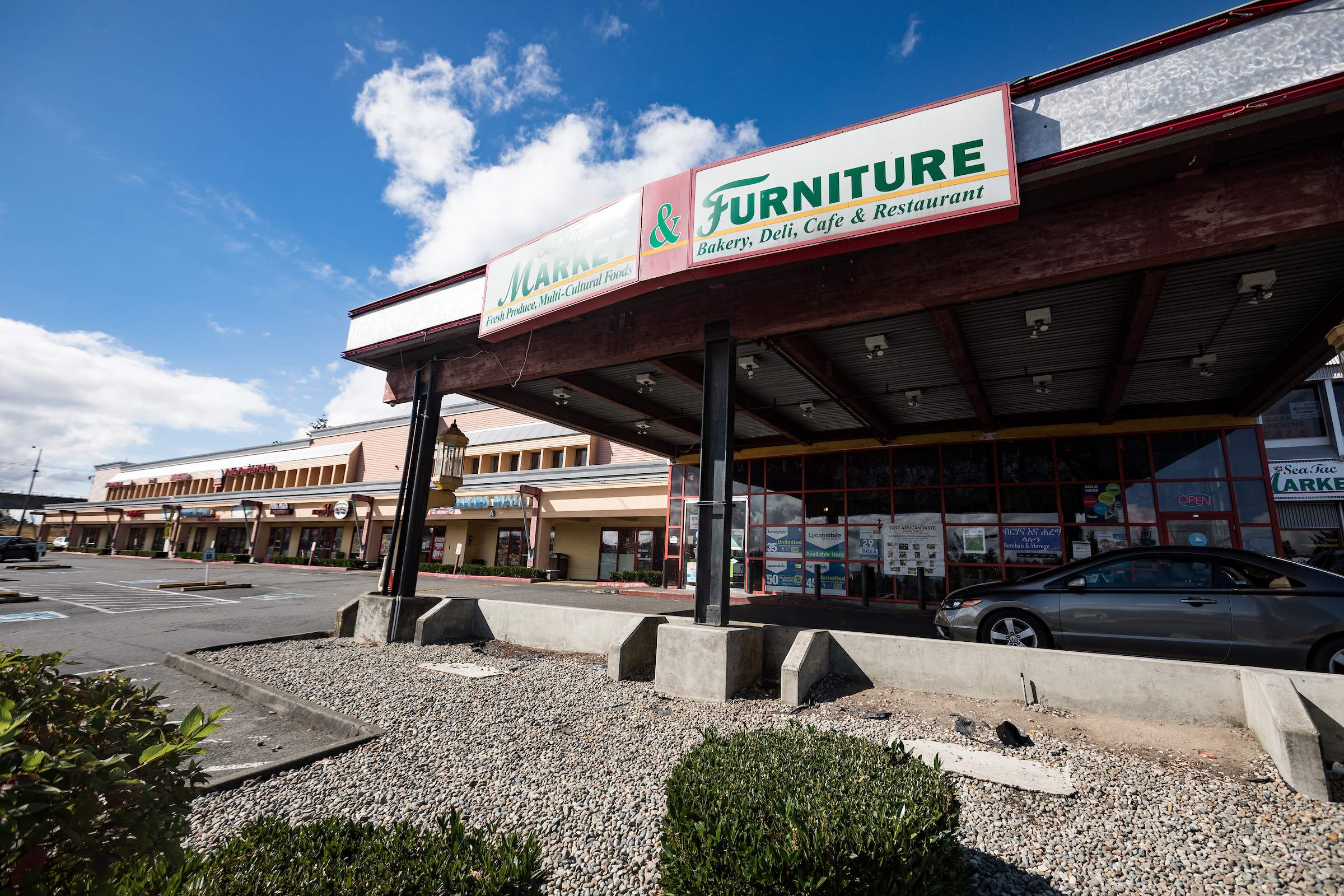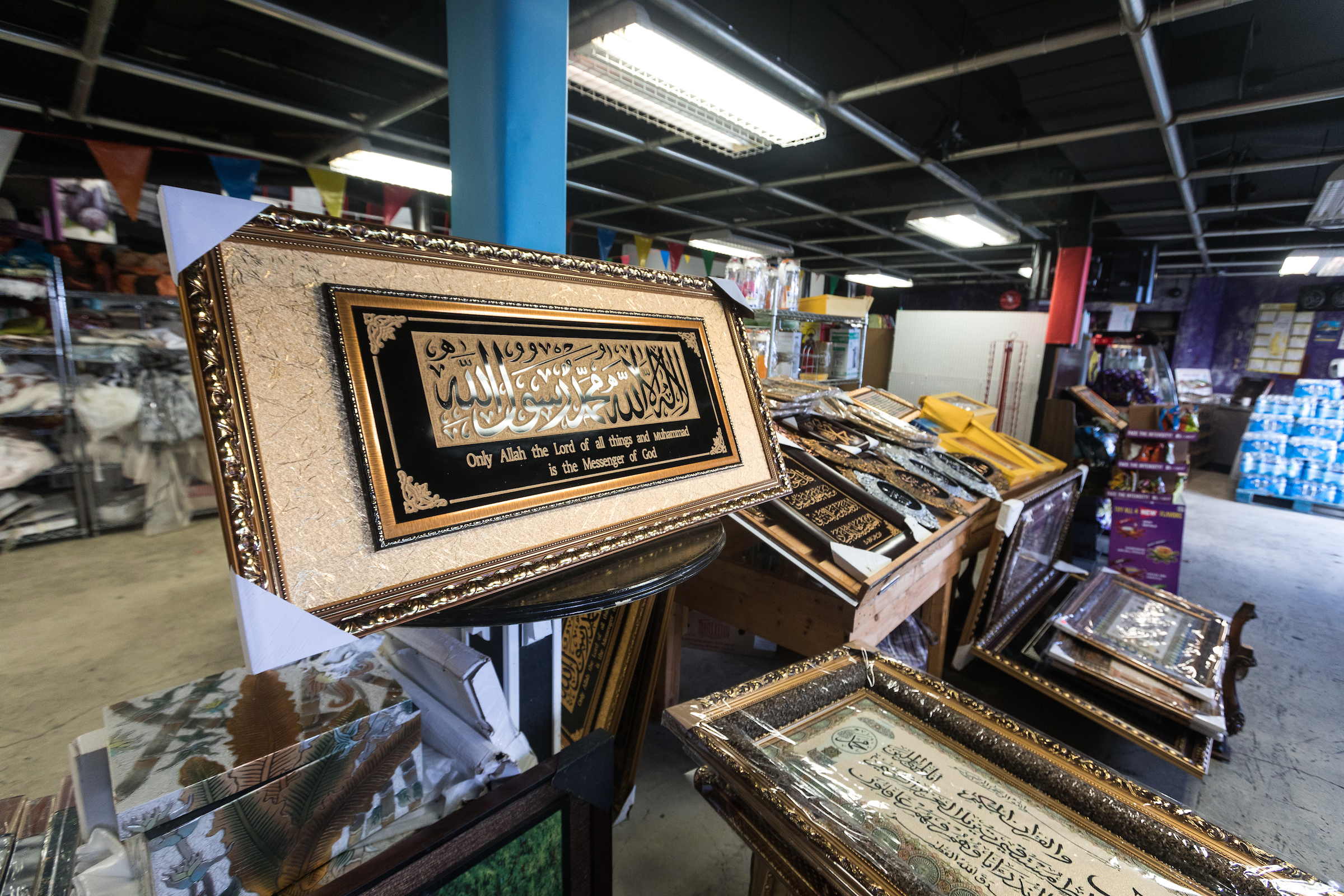“She started very small, with the Marwa Restaurant, and just built her way out,” he says, pointing to the building. “She worked three, four jobs, honestly, to the point where she raised money because she didn’t believe in taking loans or interest. So she worked hard.”
Now Abdulle owns SeaTac Market — a space taking up a big portion of a City of SeaTac-owned SeaTac Center. SeaTac Market’s stores sell a variety of East African wares, from furniture to food to decor. She and family, like Mohammed, have been in the city since 1999. But when Mohammed first heard that SeaTac City Council had plans to issue a request for proposals (RFP) seeking to develop the building in which SeaTac Market resides, he feared a similar fate as the Marwa Restaurant.
He’s not alone: Many of the owners of businesses in the building began actively worrying when they received a letter about the building’s potential sale back in March. If the city sells it for redevelopment, they wondered, what would that mean for their tenancy?
The letter detailed SeaTac’s hope to “have a purchase and sale agreement in place by the end of 2018 with a buyer of the property with their plan for the construction of a new development.” That building could become a mix of anything, from retail to apartments to offices. It added that, in the tenants’ leases, a redevelopment clause allowed the city to cancel the remaining term of their lease if it gave nine months advance warning.
“This letter is NOT a request that you vacate your suite(s) by any specific date, we just wanted to be sure you had the latest information,” wrote SeaTac City Manager Joseph Scorcio in the letter. “We encourage you to explore opportunities to remain in SeaTac, and will offer what assistance we can with your efforts.”
Some businesses had been in the same place for years, and families worried that they’d lose customers in the event of a move. Worse, they weren’t certain they could afford one. So, a group of business owners — many are immigrant Somali women — and advocates for keeping the center formed the SeaTac Community Coalition.
The coalition has since launched a “no displacement” campaign. Members have appeared multiple times at King County Council, advocating to put some of the lodging tax revenue, which will finance Safeco Field improvements, toward an international market in SeaTac. They regularly show up at SeaTac City Council meetings for public comment.
In the months since the coalition began their campaign, some city council members have voiced increased interest in retaining the SeaTac Center property and having the city do any development itself — keeping the concerns of the coalition in mind during redevelopment.
Last Thursday, tenants and members of the coalition saw their own proposal considered alongside submissions from developers like Inland Group before the Planning and Economic Development Committee. The committee included only two SeaTac council members — Peter Kwon and its chair, Rick Forschler — since its third member, Michael Siefkes, stepped down from his position as council member and mayor earlier this month.
After presentations from those with proposals, Forschler suggested holding off on selling the property in order to discuss plans for it further. However, Kwon moved to take his recommendation to start negotiations with Inland Group to full council, where both his and Forschler's recommendations will be heard on Sept. 25.
Anab Abdi, spokesperson for her family’s business in SeaTac Center called Bakaro Mall, says that the coalition has provided a voice for the businesses during a tense time.
“These businesses mean a lot to us and not just because this is an area that celebrates diversity,” Abdi says. “It’s because families depend on these businesses.”

Plans for development span years
As SeaTac council members note, it’s important to recognize that development plans for SeaTac Center have been in the works since the city announced its purchase of the building in early 2010. That desire also predates the events that have displaced Marwa Restaurant and some other East African businesses in Tukwila, where the city, after filing to take their properties for the development of a justice center via eminent domain, used mediation. Scorcio says SeaTac would have begun development earlier if it hadn’t been set back by litigation between the City and the building's previous owners.
SeaTac City Council has repreatedly told SeaTac Center tenants and subtenants that there’s no guarantee that the building will be sold. And if it is, that doesn’t mean that their businesses would necessarily get booted — in the RFP issued by the city concerning the property, they awarded optional points to proposals that retained the businesses. And the city can decide to reject all proposals and retain the property.
Still, some business owners like Mohammed say it’s hard to be optimistic. “We want to partner with City of SeaTac … but where’s the commitment to no displacement?” he says. “Can we be part of the plan? Can you show that our businesses can continue in the event of development?”
Councilmember Forschler says that he’s personally hoping that the city will choose to keep SeaTac Center and perhaps develop it into a conference center with an international market. He sees the RFP as a tool for “information gathering of what developers see as potential for that property” rather than a promise to sell.
Like the business owners, Forschler sees lodging tax revenue as a potential boost toward the development of an “international market” at the SeaTac Center. However, Forschler says that he’s only able to speak hypothetically; any such plans for developments would take at least a year or two to come to fruition. But he says it’s something that the council should be evaluating.
“If we want a successful international market, you don’t want to drive away the current tenants or the customers,” he says.
King County Council passed its lodging tax plan with a statement that support for multicultural markets (like those in SeaTac Center) should be eligible for the tourism promotion money it included. But King County Councilmember Dave Upthegrove, who represents SeaTac, describes the current money allocated towards tourism from the tax as “paltry.” The $8 million promised to tourism would be spread over 10 years, leaving little for small southside businesses like those in SeaTac Center. He failed to win support for allocating specific amounts of money to an “international market.”
Asked about the recent development, Forschler expressed disappointment about the lack of a county commitment but added in an email, “I haven’t given up ... [It] looks like we will need to become more creative.”
Some tenants question why the city wants to redevelop SeaTac Center at all.
City Manager Scorcio says that “the city acquired SeaTac Center with the express intent of land massing and selling it for redevelopment.” He adds, “There’s no new in this conversation." The letter he wrote to SeaTac Center business owners mentioned that the redevelopments were part of the City’s larger South 154th Street Station Area Plan.
Forschler adds that some form of redevelopment is necessary as the center, built in 1954, is an aging structure in need of updates and improvements. No matter what happens, he says something must change.
Tensions despite attempts to communicate
Even the tenants say that SeaTac City Council members have tried to keep them up to date on changes. Besides letters about the potential sale of the building months before the RFP, officials have assured business owners about the likely delay of a year or two in any changes.
However, some business owners and advocates expressed frustration with the manner in which SeaTac government was informing them of changes. Some had already been concerned by the events in Tukwila and wondered what it meant for them. Others remembered that litigation between the city and their building’s previous owners; among other findings, the judge of that case found that a former mayor wanted to raise property values to drive out Somali refugees living in the city. Still others mentioned being concerned after a 2016 report that said a then-interim city manager had wished to develop a “tactical map” of Muslim residents (Councilmember Forschler has called the report incomplete and inaccurate).
A special meeting SeaTac City Council organized to discuss issues with tenants ended up exacerbating the tensions. The city hand-delivered letters inviting businesses to the Aug. 15 meeting personally. Business owners say they were surprised that family members, who often handle communications for the businesses, weren’t invited. When family members came to the meeting, some felt unwelcome and many — who had come to speak or sit down with council members — left before public comment, feeling disrespected.
After conversation, however, some people returned and the meeting proceeded. The council outlined the history of SeaTac Center, their potential plans for it and opened up to questions. While council members agreed that displacement isn’t optimal, some said that temporary displacement might be necessary in order to upgrade the facility.
“We weren’t prepared for that,” says Forschler, of having non-tenants wanting to join the discussion. It turned out “rugged,” he said, expressing a wish that the meeting would have gone smoothly and improved communications, as the council had planned.
Forschler sees the SeaTac Center Coalition as a group that could potentially strengthen communications between business owners and the city. “We need,” he says, “to establish a better system of communication.”

Evaluating proposals and the building’s future
On Tuesday, council members can decide whether or not to sell the SeaTac Center property during their public meeting. Forschler says that he's not sure what will happen.
Although the full council was present at last Thursday's committee meeting, members didn't make any specific decisions or voice much opinion, he says. However, with the former mayor's recent resignation, there'll be an even number of votes at the council meeting. If there's a tie, any motion to begin negotiations with a developer will fail. It's also possible that the idea of selling the building will be put off or dropped. Additionally, recommendations from the Planning and Economic Development Committee are only recommendations and the council can choose to do something entirely different as well.
"If it had been for another property in SeaTac besides that area, I would have considered it," Forschler says of Inland Group's proposal. But for this property, he sees keeping the businesses currently there intact as crucial. Inland Group's proposal does mention a desire to preserve the current businesses in the center but adds that "it's nearly impossible to phase construction of our Project such that some businesses can remain during construction." (They do express interest in bringing back "as many commercial tenants as possible" into the space after construction.)
Anab Abdi with Bakaro Mall says that whatever the council chooses to do, she wants SeaTac Center businesses involved.
“Any future developers that they might have in mind should be complementary to the current businesses that are on site,” she says. And when developments occur, she says “it’s essential to keep the commercial spaces affordable.”
But without the ability to receive a firm commitment that they have a future at the center, Abdi says that many families are holding their breath.
“We’re all in a state of limbo,” she says. “We don’t know if things are going to work out for us or what the future looks like, and that’s not a comfortable position to be in.”
It’s the first time many of them have dipped into politics. Mohammed says he hadn’t found himself speaking in front of audiences, like he does now at council meetings, in the past.
“We never had the time to really look into this,” Mohammed says. “But now we’re really awake.”
Update: During the Sept. 25 SeaTac City Council meeting, councilmembers voted five to one in favor of entering negotiations with the Inland Group on the SeaTac Center property.
Councilmember Rick Forschler, who voted against proceeding with negotiations, said of the decision, “I’m disappointed… and I feel we missed an opportunity that would have benefited everyone in SeaTac.” He referenced his idea to redevelop the property into a conference center that would include the current tenants in its plan.
“I think this is the only place in SeaTac that we could put a convention center and… [we] lost the opportunity to raise millions of dollars in revenue,” he said.
At the council meeting, Inland Group Development Manager Keith James said that the area has long been planned for redevelopment. “Inland is committed to working with them,” he said of moving forward with tenant interests in mind. He said Inland Group expressed interest in improving the space for an international market, adding that “I think we can do that by creatively working around them.”
Anab Abdi, a member of the coalition seeking to retain the businesses currently operating in SeaTac Center, expressed disappointment with the decision. She hopes that as negotiations begin, current tenants can be included in planning.
According to Kyle Moore, the communications manager for City Manager Joseph Scorcio, the earliest the sale could go through following negotiations would be in about a year. Then it would be up to the new owner of the property to determine what they’d like to do with current leaseholders.




